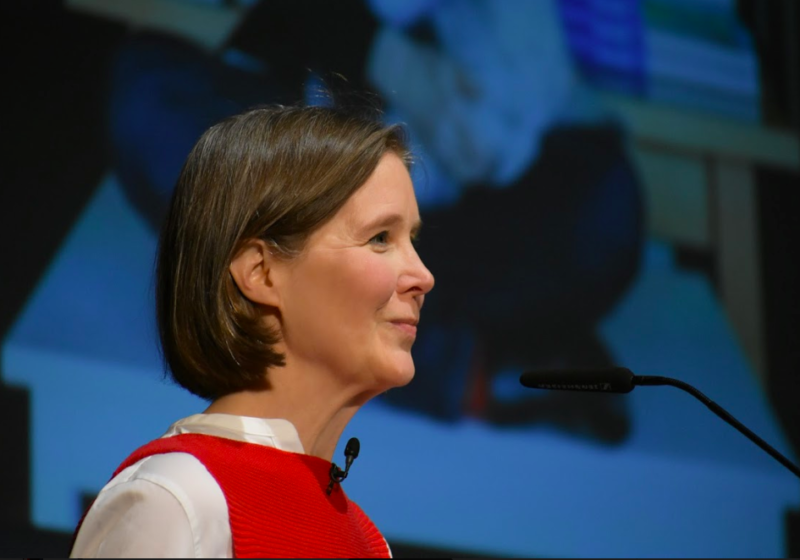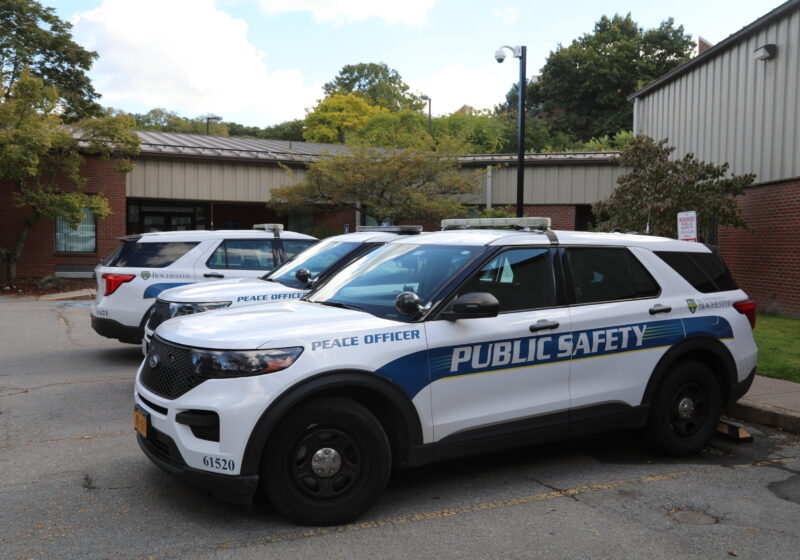Sarah Mangelsdorf welcomed Ann Patchett to Strong Auditorium on Saturday afternoon by listing a few of her accolades — an MFA from the Iowa Writers’ Workshop, a spot as one of Time Magazine’s Most Influential People of 2012, an Orange Prize, a PEN/Faulkner Award — but concluded her opening remarks by saying that her husband, like Mangelsdorf’s, is also named Karl.
The sentiment of connection was at the root Patchett’s talk. People like her. She’s easy to talk to, and she talks easy. She spoke about her age (55), her profession (novelist), and how she skirted expectations to do what she wanted (as a woman she avoided motherhood, and as a writer avoided teaching). As a part of her 31-stop book tour, Patchett appeared onstage in a professional red dress with her short, gray hair behind her ears. “Today,” she said, “I am going to be a spokesperson for why it is a good idea to be an English major and to study the humanities.”
In 1981, Patchett said she arrived at Sarah Lawrence College to read books because she wanted to write books. Her mother supported her choice to become an English major while her father didn’t. “It’s wonderful to have somebody who thinks you’re going to shoot the lights out,” she said, “and it’s also really wonderful to have someone who thinks you’re going to fail.” Patchett said she felt she didn’t have any options except for teaching. “There’s an idea that’s what we do with our English degrees. Teaching, like parenting, is the most noble of professions, but it’s not for everyone. I didn’t have kids and I didn’t become a teacher.”
But what else can you do with an English degree? “My whole life has been a journey of figuring out the different things that come from an education in the humanities.”
After talking about her husband Karl’s journey as an English major (from Tennessee to Africa to Mississippi), Patchett switched gears. “This is really a talk about how books are not just something you read and learn so that you can teach them to other people,” Patchett said. “This is about how books have informed my entire life and every aspect of it.”
In 2011, Patchett opened Parnassus Books, an independent store in Nashville, and she spent the rest of the hour talking about her life as a bookseller and interviewer.
Patchett knows secrets about the book industry. Years of being a New York Times’ bestselling author with novels like “Bel Canto” (2001) and “Commonwealth” (2016) has taught her to be smart, funny, and a good speaker. Other authors trust her, and oftentimes “their publicists will call and tell us that this person will only come to the bookstore if Ann will interview them.” They tell her their secrets, their desires, and their fears. In turn, Patchett told them all to us.
J.K. Rowling’s agent flew from New York City to personally deliver a copy of “The Casual Vacancy” to Patchett because “everyone knows we don’t have Xerox machines in Tennessee.” When interviewing Roxane Gay after she wrote “Hunger,” a memoir about rape and obseity, Patchett mentioned HGTV and Gay “lit up like a Christmas tree.” She’s spoken to everyone about everything, from Tom Hanks and his short stories to Melinda Gates and birth control.
According to Patchett, a good interviewer is a good listener. She knows what to do with each guest, no matter who they are. She agreed to speak with Harlen Coben, her favorite interviewee, because she had dated “not one, but two different guys on his hall freshman year at Amherst.” The only person she was intimidated by was Zadie Smith, because “she’s intelligent, she’s beautiful, and she’s British.” But still, when they sat down for the interview, Patchett said, their conversation soared.
That seems to be a common theme with Patchett and her fellow writers. Once Patchett thanked the postman after a flood of manuscript deliveries, and he said, “Seriously? If it wasn’t for you, we would go out of business.” So would the Nashville International Airport, it seems, which brings authors from around the country to visit Parnassus Books and stay at Patchett’s house, a literary hub in itself. Patchett invites all of her interviewees to stay at her home, a pink brick house. The second floor of that house is where she wrote “The Dutch House,” her newest novel. “I knew three things about this novel,” she said. “I wanted to write about a brother and a sister, a time period of four decades, and an evil stepmother.”
Is Patchett an evil stepmother to her stepchildren? No, she said, but she was afraid of becoming one. There are autobiographical touches in “The Dutch House,” but not about the person Patchett is — rather, the person she hopes she will never become. In their conversation, Zadie Smith gave Patchett of advice that transformed her view of literature. Autobiographical fiction isn’t necessarily about what happened to you. “It can be about what you’re afraid of, or what you want. Because what we’re afraid of, and what we want, takes up a lot more space in our life and in our minds than what’s actually happening.”







